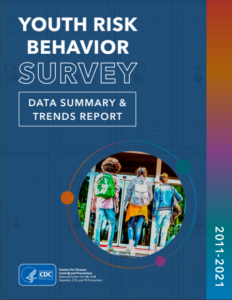Youth Risk Behavior Survey Data Summary & Trends Report
Centers for Disease Control
CDC’s newly released 2021 Youth Risk Behavior Survey Data Summary and Trends Report, provides 2021 data and 10-year trends on key behaviors and experiences among adolescents related to sexual behavior, substance use, experiences of violence, mental health, and suicidal thoughts and behaviors. The report highlights disparities by sex, race and ethnicity, sexual identity, and sex of sexual contacts. This year’s report will also include data from questions that were newly added to the 2021 national YRBS to increase our understanding of social determinants of health and protective factors among adolescents. These data are the first Youth Risk Behavior Survey data collected since the start of the COVID-19 pandemic.
Key Findings
- Nearly 3 in 5 U.S. teen girls experienced persistent feelings of sadness or hopelessness in 2021—double that of boys and the highest levels reported in a decade.
- LGBQ+ youth were substantially more likely to have experienced all forms of violence and had worse mental health outcomes than their heterosexual peers. While all teens reported increasing mental health challenges, experiences of violence, and suicidal thoughts and behaviors, CDC’s new data indicate females and LGBQ+ students fared worse than their male or heterosexual peers in 2021.
- 1 in 5 (18%) girls experienced sexual violence in the past year—up 27% since 2017.
- More than 1 in 10 LGBQ+ students reported they did not go to school because of safety concerns, while almost half seriously considered attempting suicide and nearly 1 in 4 attempted suicide.
- Youth experienced high and worsening levels of persistent sadness or hopelessness across all racial and ethnic groups; and that reported suicide attempts increased among Black youth and White youth.
Learn more on the YRBS Data Summary & Trends overview page.
